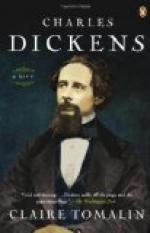CHAPTER XI.
Chancery had occupied a prominent place in “Bleak House.” Philosophical radicalism occupied the same kind of position in “Hard Times,” which was commenced in the number of Household Words for the 1st of April, 1854. The book, when afterwards published in a complete form, bore a dedication to Carlyle; and very fittingly so, for much of its philosophy is his. Dickens, like Kingsley, and like Mr. Ruskin and Mr. Froude, and so many other men of genius and ability, had come under the influence of the old Chelsea sage.[25] And what are the ideas which “Hard Times” is thus intended to popularize? These: that men are not merely intellectual calculating machines, with reason and self-interest for motive power, but creatures possessing also affections, feelings, fancy—a whole world of emotions that lie outside the ken of the older school of political economists. Therefore, to imagine that they can live and flourish on facts alone is a fallacy and pernicious; as is also the notion that any human relations can be permanently established on a basis of pure supply and demand. If we add to this an unlimited contempt for Parliament, as a place where the national dustmen are continually stirring the national dust to no purpose at all, why then we are pretty well advanced in the philosophy of Carlyle. And how does Dickens illustrate these points? We are at Coketown, a place, as its name implies, of smoke and manufacture. Here lives and flourishes Thomas Gradgrind, “a man of realities; a man of facts and calculations;” not essentially a bad man, but bound in an iron system as in a vice. He brings up his children on knowledge, and enlightened




